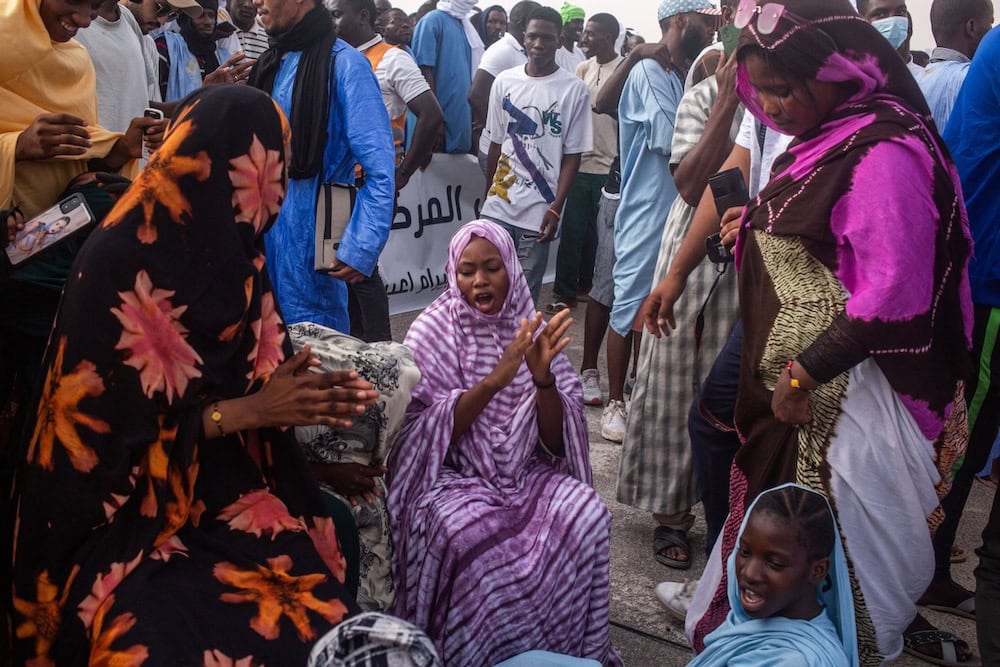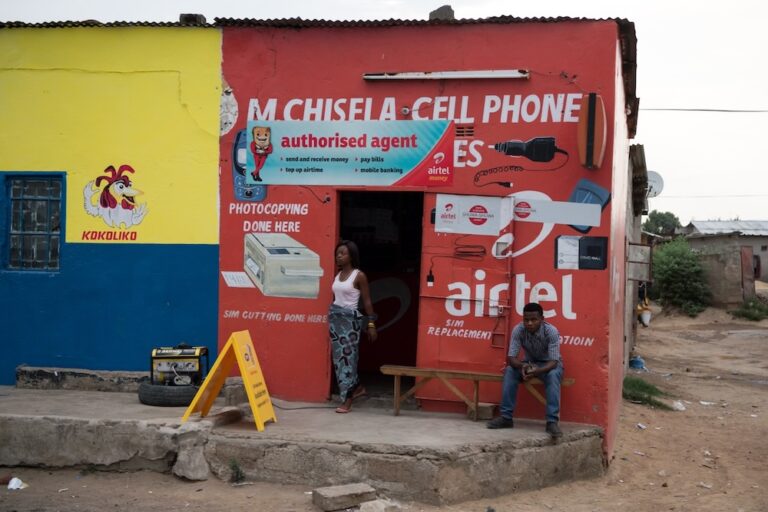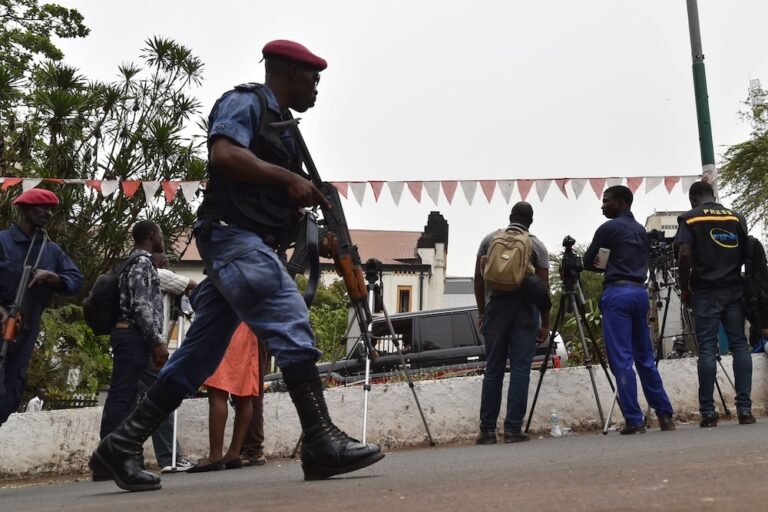July 2024 in Africa: A free expression and civic space round-up produced by IFEX’s Regional Editor Reyhana Masters, based on IFEX member reports and news from the region.
The Media Institute of Southern Africa (MISA) expressed shock and outrage at the fatal shooting of Lesotho broadcaster Pulane Macheli. She was shot and killed alongside well known Famo musician Khopolo Kholuoe on 21 July. Macheli, of MXXL Radio, was trying “to broker peace between warring Famo music groups,” reports MISA.
Earlier this year, the acting commissioner of Police Dr Mahlape Morai had issued a statement saying it was a criminal offense for journalists to publish interviews with Famo music groups. In response, MISA-Lesotho issued a statement condemning the instruction saying “the media must operate without fear, retribution or censorship from government authorities.”
Macheli is the second broadcaster to be shot and killed in Lesotho within a space of two years. More than a year ago journalist Ralikonelo ‘Leqhashasha’ Joki was killed after finishing his shift at Ts’enolo FM in the capital, Maseru.
A grim timeline as journalists go missing in Burkina Faso
In the latest string of abductions, Alain Niozè Traoré, better known as Alain Alain, is the fourth journalist to go missing in Burkina Faso within a space of two weeks. According to a statement from Omega Media group, the head of the language service was taken from his home on 13 July at 5 am, by armed men who introduced themselves as agents of the National Intelligence Agency (ANR).
This was just two weeks after Adama Bayala, a journalist at the private television station BF1 and head of the National Network of Consumers of Faso (RENCOF), was reported missing. According to the Media Foundation for West Africa, “neither his family nor his colleagues have heard from him since he left his office around 2pm on 28 June.
According to Human Rights Watch (HRW): “… days before Bayala was reported missing, a threatening message posted on the pro-junta Facebook page Anonymous Élite Alpha, warned that he ‘will be next.’ The message referred to previous abductions of journalists and dissidents.”
Earlier in June, another BF1 journalist, Kalifara Séré, was also reported missing. As reported in the IFEX June round up, his colleague Atiana Serge Oulon was taken from his home in similar fashion to Alain Alain.
The privately owned television station for which Bayala, Séré and Oulon worked has also been at the receiving end of the military junta’s hostility. Prior to the disappearance of Séré, the country’s media regulator, the Conseil Supérieur de la Communication (CSC), suspended the 7 Infos show on BF1 for two weeks. “On June 25, 2024, supporters of President Ibrahim Traoré staged a sit-in in front of BF1’s courtyard to call on the station’s management to change their editorial content,” reports the MFWA.
Geopolitical backdrop
The muzzling of critical voices through suspensions, assaults and enforced disappearances is being carried out against the backdrop of Burkina Faso, Mali and Niger severing their ties with the Economic Community of West African States (ECOWAS). Among the various reasons cited for their formation of the alternate Alliance of Sahel States, is the fact that Niger, Mali, and Burkina Faso see: “ECOWAS as a tool in the hands of Western powers and a threat to their sovereignty. They also see it as an organization that has deviated from its original pan-African ideals, often preferring to defend poorly elected leaders and Westerners rather than the expectations of their people.”
While analysts focus on the socio-economic impacts of the withdrawal of the three states, Reporters Without Borders’ report “What it’s like to be a journalist in the Sahel” points out that “in Mali and Burkina Faso, the military governments that took power in coups, have not hesitated to reshape the media landscape by expelling journalists and shutting down local broadcasting by international media.”
Silencing critical voices in Guinea
Also on the issue of enforced disappearances, Oumar Sylla (better known as Foniké Menguè), Mamadou Billo Bah, and Mohamed Cissé – three members of the opposition coalition – were picked up by Guinea’s security forces. HRW reports that “dozens of soldiers, some of whom are believed to be special forces, gendarmes, and armed men in plain clothes, arbitrarily detained and repeatedly beat the three men before taking them first to the gendarmerie headquarters in Conakry and then to an army camp on Kassa island, off Conakry’s coast. An FNDC [opposition coalition] statement suggested the three men were being tortured during extrajudicial interrogations.”
The stifling of voices by authorities in Guinea is also being shouldered by the media, who are wrestling with arbitrary arrests and numerous suspensions. This is exacerbated by the decision of the country’s transitional authority to return to civilian rule. In explaining the broken promises of the post-coup era, Togolese geopolitical researcher Komlan Avoulete points out: “these military leaders will do anything to stay there for as long as possible to address the various issues that led them to seize power in the first place […] [the] long-term consequences of these extended transition strategies are difficult to predict.”
Rwanda: A landslide victory in a repressive context
Paul Kagame’s staggering 99% electoral victory over Frank Habineza of the opposition Democratic Green Party of Rwanda and independent candidate Philippe Mpayimana – who collectively only managed 0.82 percent of the vote – was always a foregone conclusion.
Rwanda’s electoral landscape was prefaced by minimum contestation, as long-time critic Victoire Ingabire, along with strong challenger Bernard Ntaganda and high-profile businesswoman Diane Rwigara, were prevented from contesting. Additionally, Herman Manirareba, Innocent Hakizimana, Fred Sekikubo Barafinda, Thomas Habimana, and Jean Mbanda were denied from running as they were unable to submit the necessary electoral documentation to the country’s electoral management body in time.
The political landscape is restrictive. Journalists and other critical voices are silenced through intimidation, legal persecution, enforced disappearances, or, as in the case of journalist John Williams Ntwali – death under suspicious circumstances.
These human rights violations are not confined to national borders. Through interviews with over 150 people resident across various countries around the world, HRW documented “numerous cases of killings, kidnappings, enforced disappearances, and physical attacks targeting Rwandans abroad. In many cases, interviewees’ relatives in Rwanda have themselves been targets of arbitrary detention, torture, suspected assassinations, harassment, and restrictions on movements to exert pressure on their family members abroad to stop their activism. This has effectively reduced many to silence.”
Columnist and independent political analyst Sanny Rwego Ntayombya suggests that “the trust Rwandans have in Kagame and the RPF remains rock solid, even if those who had been disqualified had been allowed to run.” This sentiment was echoed by Peter Fabricius, who explains that: “many Rwandans may well support Kagame for his relatively efficient government and intolerance of incompetent and corrupt officials. For those benefits, citizens seem prepared to put up with Kagame’s authoritarianism.”
For the international community, “Rwanda has become the darling of donors and investors alike. They will likely be satisfied with a Kagame victory as it should ensure continued stability and development in a region long hamstrung by conflict.”
Mauritania disrupts internet amidst post-election tensions
In contrast to Rwanda’s peaceful election, Mauritania’s post-election scenario was fraught with tension as supporters of rival candidate Biram Ould Dah Abeid took to the streets to protest the re-election of President Mohamed Ould Ghazouani. The clashes with security forces culminated in the death of three protestors, closely followed by disruptions to mobile internet infrastructure, while fixed networks remained operational. Internet connectivity was disrupted from the early hours of 2 July and reinstated 22 days later.
This targeted interruption places a slight dent on the accolades Mauritania received, following the significant jump on the Reporters Without Borders World Press Freedom rankings from 53rd place to 33rd, placing it at number one on the African continent.
In brief
The acquittal of Nigerian journalist Agba Jalingo of Cross River Watch of cybercrime charges is described by the International Press Institute as “a landmark step in enforcing fundamental rights and protecting press freedom, in the face of increasing weaponisation of cybercrime laws on the continent.”
Former eSwatini members of parliament Mduduzi Bacede Mabuza and Mthandeni Dube, who were arrested in 2021 for their involvement in pro-democracy protests, were sentenced to 25 and 18 years in prison, respectively. While in detention, both Mabuza and Dube were subjected to beatings and denied access to medical care and legal representation.
As Ghana gears up for elections at the end of the year, the MFWA has resumed monitoring the content of numerous radio stations, part of a number of interventions intended to promote “inclusive social and political narratives devoid of hate speech, toxic and polarising narratives”. The first report, based on data from June, noted 46 incidents of inflammatory expressions, with the majority (54.4%) occurring during discussions on: elections (21.7%), security (10.9%), corruption (10.9%), and development projects (10.9%). This was followed by issues related to the presidency (8.7%).



